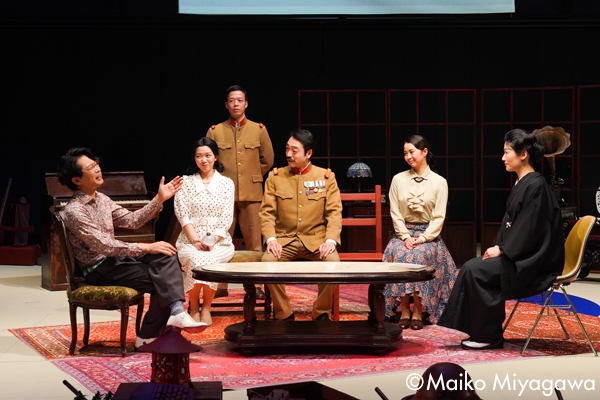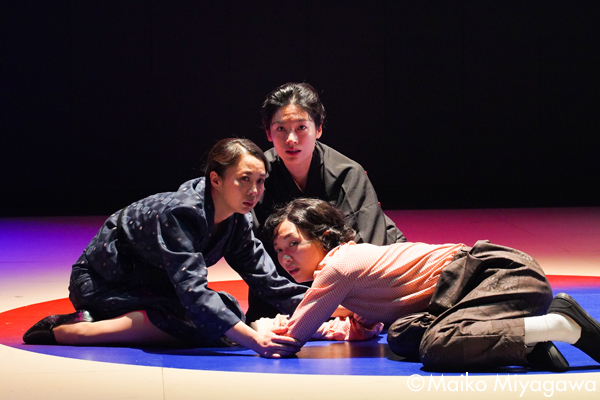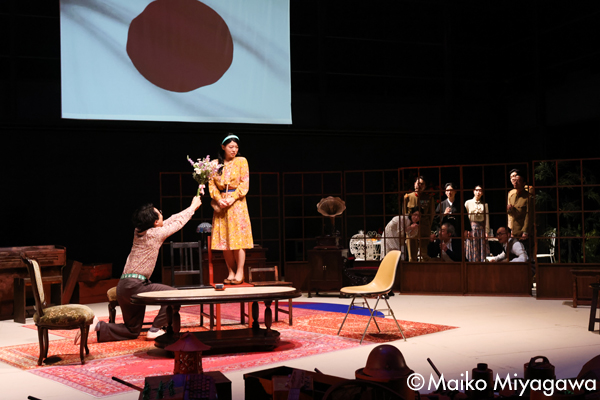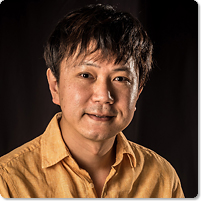


KAAT ✕ Tokyo Deathlock
Gaichi no San Shimai
(Dec. 12 – 20, 2020 at Kanagawa Arts Theater-Large studio)
Photo: Maiko Miyagawa
Data
:
Premiere: 2020
Gaichi no San Shimai
(Three Sisters from Abroad)

Born 1974. Playwright, director, leader of the 12th Tongue Theater studio.
While studying Korean Language and Korean Literature at Yonsei University, Sung spent one year studying Japanese on an exchange program with the Korean department of Tokyo University of Foreign Studies in 1999. After returning to Korea he did graduate studies at the Korea National University of Arts’ School of Drama.
In 2006, Sung debuted as a playwright and director with his play Private Third Class. In addition to his activities as a writer and director, Sung was also active in multiple roles as a translator, interpreter, directing assistant and producer in the world of Japanese and Korean theater. Working in collaboration with Japanese director Junnosuke Tada of Tokyo Deadlock, he created the plays Karumegi (2013) and Taifu Kidan (2015). Among his works as a translator are the three-volume collection of selected plays of Oriza Hirata, titled Collected Plays of Oriza Hirata, and he has co-translated and published [Oriza Hirata’s] For Contemporary Colloquial Theater, and published Collected Plays of Yoji Sakate,: The Attic.
In 2011, Sung’s production of Kagakusuru Kokoro – Mori no Oku Hen (The Scientifically Minded – Deep in the Forest Edition) based on the play by Oriza Hirata won the Excellent Drama award of the 4th Korean National Theater Grand Prix; in 2012, he won the Best Director award of the 1st Seoul Theater Grand Prix for a production of Too much love, too many; in 2013, Sung’s play Karumegi won the Best Play, Best Director and Best Visual and Sound Design awards of the 50th Dong A Play Awards; and in 2014, he won the 4th Doosan Artist Award and the Young Artist Award of the Ministry of Culture, Sports and Tourism.



KAAT ✕ Tokyo Deathlock
Gaichi no San Shimai
(Dec. 12 – 20, 2020 at Kanagawa Arts Theater-Large studio)
Photo: Maiko Miyagawa
Data
:
Premiere: 2020
Act I
It is April 1935, and this day is both the date of their father’s death and the 20th birthday of the third daughter, Naoko. In the guest house next to the Fukuzawa home lives their uncle Chiba, who is a doctor, and there are friends from the military visiting (a baron named Park who has both Japanese and Korean blood, his affiliate names Souma and a Major named Kido).
At Naoko’s birthday celebration, there is talk about a lieutenant colonel named Isobe who has been newly assigned to the military post, and as they talk, Isobe himself arrives to introduce himself as a newly posted officer. The sisters introduce him to their younger brother, Akira, who say with pride is studying international politics.
To this scene, the second daughter Masako’s husband Kurayama, who is a middle school teacher living nearby has come to get his wife. As Isobe, Park and Souma, who are romantically interested in Naoko, are talking pleasantries when Akira comes in with his Korean girlfriend Son-ok.
When Son-ok, who feels rather uncomfortable in the presence of the guests, tries to leave, but Akira is determined to take this opportunity to announce that he plans to marry Son-ok and begins his proposal to her.
Act 2
The scene shifts to December 1936, and amidst the town’s festival celebrations, a houseboy of Yanaihara, member of the Hokkaido Prefectural Assembly, by the name of Huang Doi come in to deliver a letter to Akira, who has just been appointed a member of the local assembly.
Son-ok, who is now Akira’s wife and living with the Fukuzawa family, is complaining to Akira that their baby’s room should be changed with Naoko’s room, which gets more sunlight.
Masako and Isobe come back together from the festival. Both of them are married but dissatisfied with their marriages, and they apparently have become attracted to each other. As they exchange words of love, they are overheard by the Korean maidservant, Kannan.
Naoko, Park and Souma return to the home in their festival costumes. The custom with this festival is that women dress up as men and men as women. As they chat, the conversation turns to the question of what the world will be like in 100 years. Isobe says that he thinks globalization will spread and capitalism will emerge as the world’s leading economic system. Park says that his only hope is that the world will be at peace in 100 years, and he says that he plans to quit the military.
Son-ok appears with a letter and hands it to Isobe. See that it says his wife has attempted suicide, he rushes out.
Yoko and Kurayama come back from school exhausted. Son-ok asks in tears for Yoko to turn down the invitation to host a group of military officers at the house that night as planned because her baby is not well.
Yoko tells Masako there is gossip about the fact that Akira is frequenting a gambling house. That night as well Akira has gone off with Chiba for Mahjong gambling.
Souma tells Naoko that he loves her, and tells her not to go along with Park, who is thinking about moving to Manchuria.
Kurayama has come to get Masako in the night, having woken, Son-ok begins arguing vehemently that the baby’s room should be moved to a warmer room. During the ruckus, Naoko tells Yoko that she wants to move back to Tokyo.
Act 3
The scene moves to the middle of August 1939, just past 1:00 in the morning, a fire bell sounds. Yoko cleans up to make room for people who have been burned out of their homes. While helping out, the elderly maid Sayo begs her not to leave her homeless now that she has nowhere else to go.
Son-ok comes and scolds the tired and resting Sayo as a lazy person. When Yoko reproaches her for that comment, Son-ok retorts that as a Korean working hard to maintain this Japanese family, she is the true wife of the household, so she thinks things should be left up to her.
Kurayama has come to take his wife Masako back home, congratulates Yoko on having been promoted to curriculum coordinator at the school. But, he can’t help but comment that she would have been better off remaining an ordinary woman.
When Chiba arrives back drunk from a house call, he bumps into Huang and they both swear at each other in their native tongues.
When Isobe arrives seeking shelter from the fire, he relates the rumor that the fire was started by dissident Koreans. Isobe flinches in disgust when he sees that his wife, who has continued to cause trouble with her repeated suicide attempts, has also sought shelter here and is busy eating with no sign of apology. Masako goes to pieces when she hears that Isobe is soon going to move to Manchuria.
Meanwhile, Park, who has found an administrative post at the mine to the north, asks Naoko if she wants to work with him there.
After everyone has left, the three sisters talk about the sad state the Fukuzawa family has fallen into, with the house now mortgaged as collateral against Akira’s gambling debt, the fact that his wife Son-ok is having an affair with his superior, Yanaihara, among other things.
Naoko, who has been working as a waitress at a café to make ends meet, is at the end of her rope, physically and mentally. Yoko recommends that she marry Park. Masako admits to her extramarital affair with Isobe, but Yoko stubbornly refuses to accept their relationship.
Akira appears and he admits that Son-ok has complaints about him but insists that they are beyond criticism. He apologizes for putting the house up as collateral, but then he shifts the blame by angrily accusing the others because they wouldn’t stop gambling, and then he leaves.
Act 4
The scene shifts to early in October of 1942. War is raging and it is a Sunday. Naoko has decided to marry Park, and everyone has gathered to see off Kido, whose battalion is being sent to fight in the south. Sensing Naoko’s feelings of insecurity, Chiba gives her a copy of the Ten Trainings for Marriage.
As Akira walks his two children in a baby carriage, Son-ok is enjoying time with her lover in a back room of the house. As usual, Kurayama is trying getting his wife Masako to come home, and Huang is telling his niece Kannan to stop working at the home of a Japanese family.
Akira tells Chiba that he will soon be selling the house to Yanaihara, so everyone in the Fukuzawa home will have to move out.
The day has come when the Japanese garrison force is moving out. Isobe has come to say farewell and Masako clings to him, begging him not to go. Knowing that he cannot do that because of his ties to the nation, he pushes her away. Masako crumbles to the ground in tears. Kurayama tells her, “Let’s forget the past, we have no choice but to live on here together, forever.” Masako mutters, “Live on. As if we are dead, as if in sleep.”
Souma comes running in, saying that he has dueled with Park and killed him. Chiba, who had stood as Souma’s second at the duel says that Park came with a wooden sword, but Souma came with a military sword. Screaming in rage, Naoko approaches Souma.
The sound of the military band spurring on the garrison force is heard. Souma sputters out, “We never should have started a war like this. Japan, we of the Yamato race, it is best if we now return to live our island nation. There, by ourselves, we can create a pure unison.”
Left behind are the three sisters and Chiba. Yoko says, “We who are left here have to do the best we can, not looking back, but looking forward.” To this, Naoko asks, “which direction is forward?” Indeed, for those left behind, what should they look to as their future?
Related Tags